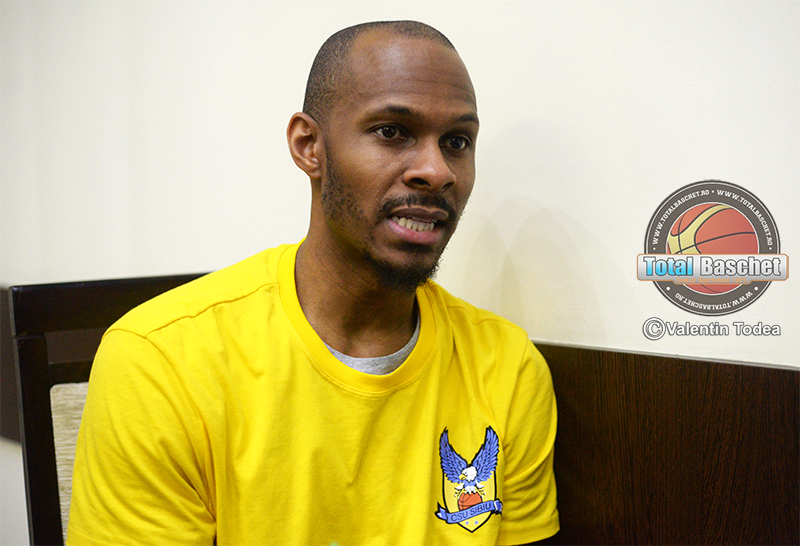
In this afternoon, BC CSU Sibiu will play the second leg of the Romanian Cup Quarter Finals against SCM U Craiova. There is a big chance that Daniel Ewing will play his first official game in Romania tonight so we decided to put the English version of the interview today.
A couple of weeks ago we had a long discussion with Ewing, and he allowed us to enter his life story.
Q: Hello and thank you for accepting to give us this interview. First of all, I want to ask you to present yourself both as a player and as a human.
A: „My name is Daniel Ewing. I'm a 14-year pro at this game. Technically 14 years, unofficially this is like my twelfth and a half year. I've been out for the last year and a half. I've played in many places, played in EuroLeague for 5 or 6 years, Eurocup, EuroChallenge, FIBA. I've played in every competition. I was drafted in the NBA in 2005, played with the LA Clippers for two years. Then, after that, I came to Europe and I've been playing in Europe very since. I started with Khimki and then from there I went and played with Prokom in the Polish League, I won three titles there. You know, played well in the EuroLeague, made it to the Final 8 and so and so on."
Daniel Ewing Jr. became well known since high-school when together with TJ Ford he won two titles in the Texas State championship. Therefore, in 2001, he was named Texas Mr. Basketball and McDonalds All-American
Q: But before turning pro you had some huge success in high school, you were 2-times champion. So, how was handling success at such a young age? I don't know how old were you, maybe 15, 16, 17.
A: "15, 16, yeah, yeah, yeah. I mean, I come from a strong family. I come from a good support system so it wasn't difficult. You know, I had the right people around me telling me the right things. And so, you know, I had good teammates, good coaches so it was a community of good people helping us and supporting us. Being a young boy, the youngest of three kids, I have two brothers who I looked up to. So, I was kinda grown to be the basketball player that I became, the athlete that I became, because of my older brothers and my dad. The success in high school was expected, not necessarily that I knew it would happen, but we've been playing for those things. The hard work that we've put in, me and my teammates, it paid off. So we were prepared for it when it came."
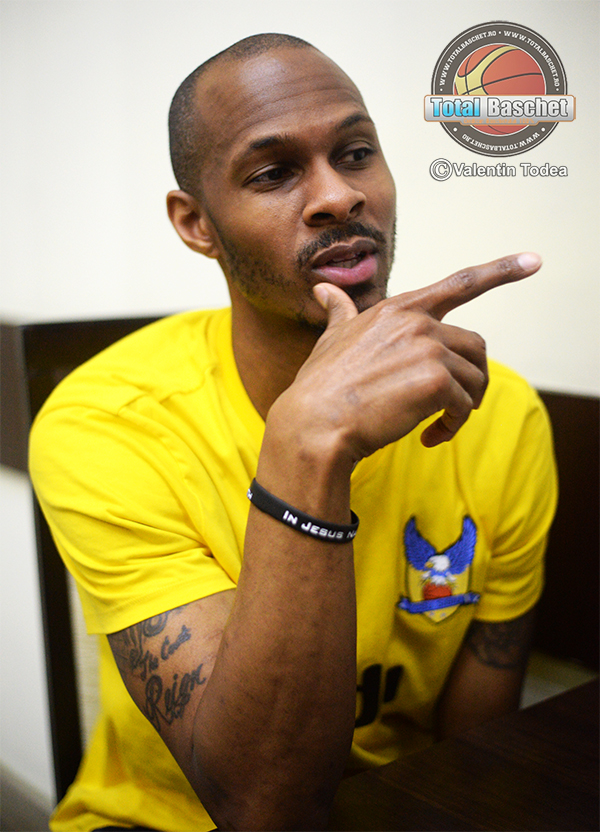
After his great career in the pre-university period, the current player from Dan Fleșeriu's roster arrived at Duke University, one of the best basketball programmes in the United States of America. Under Mike Krzyzewski's command, Ewing played for four seasons along with other basketball players such as Jay Williams, Carlos Boozer, J.J. Reddick, Luol Deng, Mike Dunleavy, and so on. In 2004, Duke University qualified to the NCAA Final Four, where they had a great first half against Connecticut Huskies. However, UConn managed to get back in the final minutes and to defeat the university lead by Coach K, which missed the chance of qualifying into the National Championship game.
Q: And that got you to one of the greatest universities in the US, to Duke. How was the recruiting process?
A: "The recruiting process wasn't crazy. It wasn't crazy like most that you hear about. You know, I had like about every major school recruiting me and once I got the call from Coach K that ended the recruiting process. You know I got the phone call and they were offering me a scholarship if I wanted it and I took it and then, you know, the rest was history."
Q: What did you learn the most from Coach K?
A: “It's a lot, I mean it's a lot. You know, he comes from a military background, he has a lot of experience in life not just in basketball. So, a lot of things he is teaching the kids. You learn how to be a young man. How to handle your integrity, character, and building that type of stuff. And of course, the basketball side of it takes care of itself. You know he is one of the greatest coaches in all of basketball, not just college. So, when you are playing for a program like Duke, you are a top team just about every year. So, just playing the game the right way and as I said, life lessons, experiencing different things at a young age that you wouldn't normally experience. You know like going to an opera, cultural things different than just basketball. So, those were the type of lessons that you learned when you were playing at Duke University."
Q: With Duke, you went to the 2004 NCAA Final Four and there you had a more difficult moment. I wonder how you recovered as a team after such a heartbreaking loss.
A: “I was a great season, it was probably one of my best seasons just as a team that I was there from my four years. So, obviously, we made it to the Final Four, we were a game away from playing in the National Championship. We should've won the game, we were up maybe 10 or 12 points with 2 minutes to go and we lost the game. So, you know, it was a very tough loss. But that is a part of sports, it's a part of basketball. Coach K and the others in the coaching staff they were always talking about the next play. When something doesn't go good they were like 'Ok, next play'. So, for us, we lost, it was heartbreaking but we had to move on and the next play was the next year that we had to try to come back and get to the same stage. And that was our mentality every year, when you don't succeed and when you do succeed. The next play you try to get back."
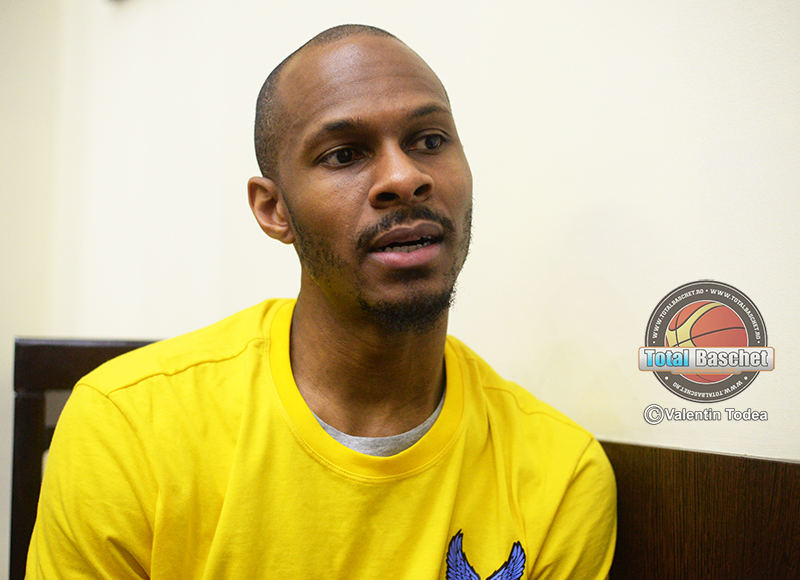
After finishing college, Daniel Ewing participated in the 2005 NBA Draft, where he was selected with the 32nd pick by Los Angeles Clippers. The 1.91m point guard played for two seasons for the Californian team and had some matchups with the best basketball players from that time: Kobe Bryant, Allen Iverson, Dwayne Wade, LeBron James, Shaquille O'Neal, Steve Nash, Tim Duncan, and so on.
Q: Finally, you got into the NBA. How did you feel when you saw your name and you found that you got selected? I suppose it was one of your dreams from a young age.
A: “Of course growing up I wanted to be a professional athlete, a basketball player. You know you dream as a kid of making it into the NBA, you dream of getting drafted and hearing your name called. So, it was one of the best days of my life at a time and even now. It was one of the best days of my life and to see the dream come true... you know, those two years, it was short playing into the NBA, but those two years were two of the best years in my life. Being able to experience the NBA and getting the chance to play against some of the best players in the world, some Hall of Fame players. The only thing that I would change is having more time in the NBA, but everything else was a lesson. And some of it helped me be the player that I've become in Europe. You know, having to deal with some of the things that I've dealt with, while I was in the NBA.”
Q: Did you have some matchups with Kobe Bryant? How was the rivalry between the Clippers and the Lakers?
A: “At the time, Clippers were better than LA. Right now they are not better than the Lakers but they are playing better. But at that time we were the better team so it was different for the city. You've got the team that nobody was really rooting for and then people started to root for the Clippers a little bit. You know, we made it to the playoffs that year, made it to the second round so a lot of good things happened that first season. It was exciting. Actually, I started a game against Kobe and I was responsible for guarding Kobe that game."
Q: How was that?
A: “It was good the first half, it was great. So the first half I believe we were winning and I know for sure Kobe had just about 12 points at half time. So, I pretty did my job. In the third quarter I played only 3 or 4 minutes and then the coach took me out and I didn't play anymore. And Kobe ends up with 50 and hit the game-winning shot. So, that's a good Kobe story.”
Q: Ionuț Georgescu intervened here: Was he trash-talking?
A: “You know, he wasn't saying much. In the first half, he couldn't say much cause he had only 12 points and they were losing. But, he ended up with the last laugh."
Q: I've listened to a lot of podcasts with players that played in NCAA and they all said that the atmosphere is different in college. They live together and they do everything as a team, so how was the shift to the NBA where is more individual?
A: “It's more like Europe. You know, it's more like Europe, except you don't get paid. In Europe you're with your teammates a lot, you eat team meals and all this stuff. It's the same way in college. You're together just about every day, you share your room or your apartment with one of your teammates most likely. But the only thing is everybody makes money, except the players. It's definitely a more closed atmosphere, more fan frenzy. Not saying that there aren't great fans in the NBA but is more closed and personal with the fans in college basketball than in the NBA."
Q: Have you met here in Europe such crazy fans like in college basketball?
A: “Yes, I mean, I have. I've played in Turkey one year with Besiktas and not only Besiktas fans but the Turkish fans, in general, they are very good knowledgeable fans. And in Lithuania also, they are a very strong basketball country. But also I've played against Partizan Belgrad. Those fans, that atmosphere is like college. That atmosphere is like college basketball. Also, the teams in Greece, Panathinaikos, and Olympiakos have good fans and Spanish teams. To me, there is a lot of good supporting fans around Europe. But some fans are more special than others. Like, you know, the Partizan fans and some of the Turkish teams."
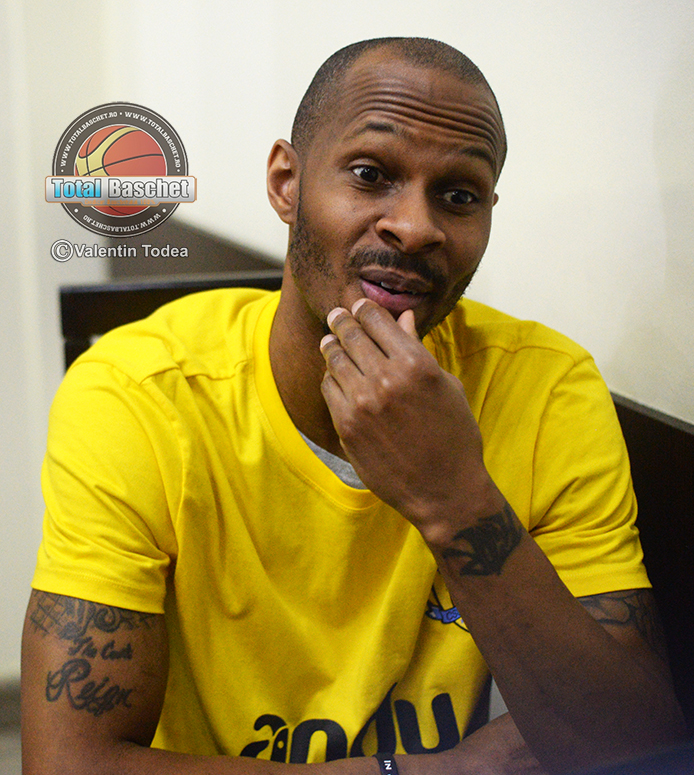
In 2008, Daniel Ewing Jr. signed with Khimki Moscow, a team with which he won the Russian Cup. After a year spent there, he went to Poland at Asseco Prokom Gdynia, where he stayed for three seasons. In this period of time, Ewing won three consecutive titles and played in EuroLeague, qualifying one time to the Quarter Finals. Then, the athlete born in Milton, Florida, went on a true tour of this continent, playing in Ukraine, Turkey, France, Lithuania, and Israel.
Q: After two years in NBA you came to Europe. Did you ever consider before coming to Europe, maybe when you were in college? I read that you've been before to Moscow.
A: “I knew nothing about Europe until I came to Europe. I think it was my first or second year with the Clippers when we did the NBA Europe Tour and we actually went to Moscow and played against CSKA and Khimki. So, I think that's how Khimki already knew about me. But, yeah other than that I had no idea about European Basketball."
Q: Then how hard was to adjust to European basketball?
A: “It was pretty difficult. Just because there's a different philosophy about the game and how it's played as opposed to the NBA. You know, the NBA was more free-flowing at the time, more isolation basketball. It's different now, you know, the game has changed. Then there was a lot of isolation basketball and Europe is like college. It's more team-oriented basketball, more passes, it's like a system. Just the philosophy, not actually the game style, but the philosophy of European basketball as opposed to the NBA back then was different. So that was the biggest adjustment."
Q: After one year with Khimki you went to play for Gdynia in Poland where you won the title three times. How was the feeling of becoming a champion again, the first time since high school?
A: “It was great. As I said, it is very rare that you get the chance to have a team where most of the guys stay together for three seasons in any place. It is very rare. And so for us, that was the big thing. That was the reason for our success because we had most of our guys play for the same team for three years. And we had a lot of talent. So, we did really good in EuroLeague. We represented Poland in the EuroLeague and what we did in the second year making it to the Final 8, falling against Olympiakos, and being able to beat teams like CSKA, Panathinaikos, Real Madrid. That was one of the better experiences for me, those three years there. Especially looking back now. While I was there I didn't understand it, I was still young in Europe but looking back now it was really successful stuff those three years in Poland.
Q: What do you think about the competition's defense? I mean a lot of basketball fans say that in EuroLeague is a better defense than in the US.
A: “I wouldn't say better defense. As I said, the rules are different. So, you have really good talent, you have NBA talent playing in Europe and not just in EuroLeague but also in Eurocup and other places. So the fact that you can play zone and there is no defensive three seconds rule that's an advantage for the defense. In the NBA the rules are different, a 7-footer can't just sit in the paint and say 'Hey, I'm here, drive'. But, I mean, it's tough for the scorer in Europe. It's a lot tougher because of the rules and the defense that you can't play. Like Luka Doncic said a few weeks ago, exactly what he said is true. He's experiencing that it's much easier to score in the NBA than it is in Europe. It's not a knock on the NBA defense but is the rules allowing it to where it is much easier to score. It is a more free-flowing game whereas in Europe it is more physical, the defense can be set already in the paint, so it's just the rules. The rules are what make the difference."
Q: So after Poland, you spent some time in Ukraine, Turkey, France and then you arrived in Lithuania which is one of the biggest basketball countries in Europe. How was there? How were the derbies with Zalgiris?
A: “It was great. That first year I was there we lost in the Finals to Zalgiris but that was a historical year for Neptunas, the team I was with, making to the Finals, doing the things we did in the Cup and all these stuff. I mean, Zalgiris is a historical top team in Europe, in the EuroLeague, so it's always tough going up against teams like that. It was a great experience, as you said, a very basketball fanatic country. So, you know, people love basketball there, the atmosphere in all the games are great. So, playing against Zalgiris, playing Rytas those were always good derby games."
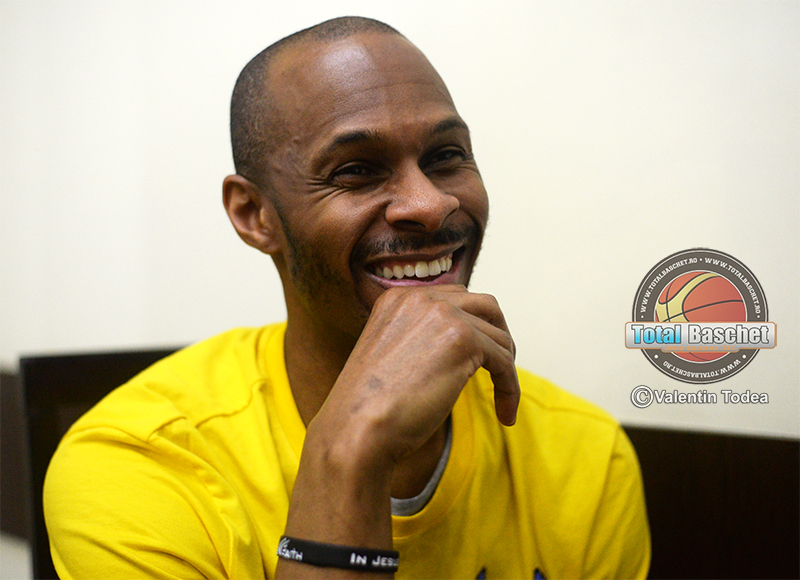
In 2018, Daniel Ewing left Europe for the first time in 10 years and signed with Ferro Carril Oeste in Argentina, but he didn't stay there much. In the past year, the 35-year-old sportsman didn't have any contract and started to seriously consider retirement. However, one month ago, Ewing accepted to come to BC CSU Sibiu, being motivated by the proposal that was made to him.
Q: Finally, you went to Argentina and stayed there for a bit and then this season you haven't played until now. What kept you moving forward in these more tough moments?
A: “Actually, I wasn't really thinking about basketball. So I wasn't really moving forward, I was moving on to the next part of my life. Yeah, I was kinda unofficially retired."
Q: Ok, then what made you come back?
A: “This guy (points to Ionuț). He sent me a message over a social media, I responded, I listened to his proposal and I thought it was pretty good. Luckily, I had never put it there that I actually retired, but in my mind, what I was doing, I was moving on from basketball. So, I never put it out there like, you know, 'Thanks for everything, I'm retiring'. I mean I still wanted to play, I still had love for the game so when he sent me the proposal about what he thought I could do with the team I said 'Why not? Why not giving myself a shot to finish playing?'.
Q: What do you think of Sibiu and the organization, the team?
A: “The team is great, all the guys are great, all the guys get along, is good chemistry here. I'm still filling out the things that I don't know about the organization. I think they have a good thing going. He's coming from a winning background himself (Ionuț Georgescu) so he's trying to maneuver some things, and change some things and move things forward. I think if we continue to play well and things go as expected, you know, winning the championships and playing the Finals that's going to boost the reputation for Sibiu. Hopefully, it will continue to build forward for many years."
Q: I saw you playing in a friendly game last week. What do you think about the fans, they were cheering for you all game?
A: “It was a great reception. It felt good. I wasn't really supposed to play. You know, I told coach 'Hey, let me try to see how I feel' so he was like 'Ok, go out there but be careful'. It felt good to get back on the court cause I haven't really played in almost two years. It's always good when people call your name and cheer for you so it just felt good. The atmosphere was good. Hopefully, the same energy that they bring I can bring also to get back to the fans once I start playing."
Q: In that game, I saw you in the last quarter and you were playing with the young players from Sibiu. And I was thinking while I was watching that game that maybe 15 years ago you played at Duke with Jay Williams, JJ Reddick, Luol Deng and other players. So in this game how did you feel? Have you taken the role of a mentor?
A: “I mean, it's just a part of getting older. I've been in this situation, I'm 35 now so I've been in this situation for a few years where it's like me being the oldest. I've been the oldest like the last two years but other than that I've been one of the older guys like since I was 32. So, it's just a part of still being able to play at this age. It's part of my role now, you know, not only just to play but be a mentor to the young guys and just provide that type of leadership."
Q: A few days ago I saw that you've been to a young boy's birthday. How was that experience? I think you made his day.
A: “It was great, it was a great experience. It was kinda bitter-sweet because my son's birthday was a few days before so I wasn't able to attend his birthday. But to put a smile on little Vlad's face and for him to really be appreciative of us being there it was good. We had some fun. "
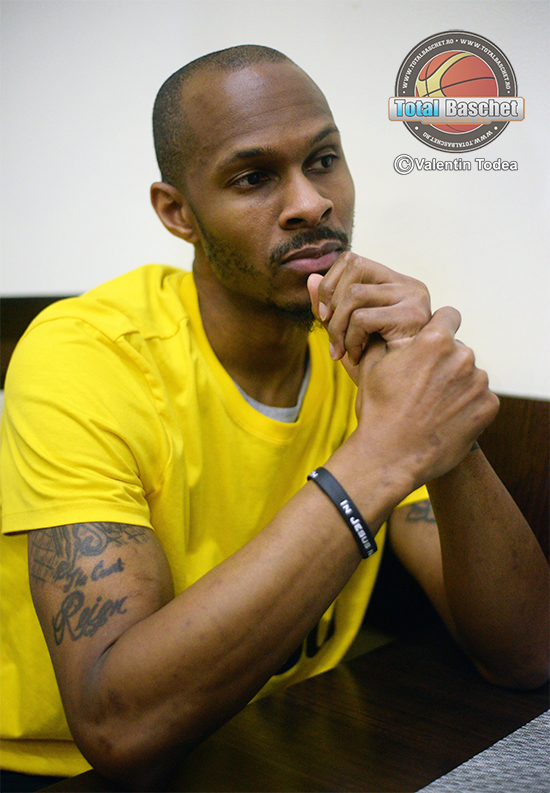
In the last part of the interview, we tried to focus more on the personality of Daniel Ewing so we asked him a lot of questions regarding life, basketball, and principles.
Q: What do you think that makes a player great?
A: “A lot of things. It's not just one thing it's a lot of things. You know, to ask what makes Michael Jordan great the answer would be different to what makes LeBron James great. So there are a lot of different things that combine and make someone great. You can't just take a few things and say that's what makes a player great. You know, there are a lot of things that go on to players being great."
Q: I've heard a lot of persons that say that athletes are role models to kids or maybe young adults in society. So from this point of view how do you see a player which not only plays but it is also implied in the society?
A: “Well, it's all on the individual. I get the example again: Michael Jordan and LeBron James which are considered two of the best players ever, right? But LeBron James is more active and vocal in political and social issues and his philanthropist activities are more known as opposed to Michael Jordan's. He was more business side, he didn't really care. I'm not saying that he didn't do things for the community but you didn't hear about that. But you hear about all the things that LeBron is doing which give you a different outlook on him as a person. I mean, he's a great person. Michael Jordan is a great basketball player so it just depends on the individual. So, everybody takes responsibility differently. Not everybody is like Charles Barkley for example ("I'm not a role model"). Not everybody wants to have that responsibility. For me, I try to live my life the right way and do the right things. I try to do the things the right way so when somebody's watching I can be a good example whatever it is that they might see."
Q: Then what are the most important things in life for you?
A: “I would say my faith in God and my family are the two most important things. I mean those two things can carry you pretty far just those two things. Other things come and go. You know friends come and go, money come and go, basketball, nothing of that other stuff is guaranteed. It can be taken away, just like your family can but your family is always there for you and you can always rely on your faith, you know, in times of troubles."
Q: How did your faith influence you in your career? I've read that your mother used to pray in every game in high school.
A: “Yeah and in college too. But in high school, she was like when a game got tough she couldn't watch it. She would just put her head down and start praying. And so I grew up in a Christian family in my whole life so my dad being a preacher when I was younger, my brothers now are preachers so I grew up in Christian atmosphere all my life and it's been a part of my life. And it has a big influence on how I do things and why I do."
Q: So who had the greatest influence on your life?
A: “I would say my family as a whole. Maybe my dad, you know, the way he raised me. When we were boys he showed us how to grow up loving, caring and he supported us. Also, being the youngest, all the family supported me. They said: 'Ok, this is your dream? This is what you want to do? We think you have what you have to do it so we're gonna do everything that we can to help you to get to that level, to be a professional basically'. "
Q: If you could give advice to a young Daniel what would you say?
A: “With what I know now I would say 'Never take anything for granted. Even when you have success, that can be taken from you.' I made it to the NBA, I fulfilled that dream but my dream was actually to have a career in the NBA. So, that didn't necessarily happen for me, most of my career has been in Europe. So, I would say 'Just to don't take things for granted. There's always room or improvement. When you're younger and everything is going good and you get a lot of money you kinda lose sight of things that got you there.'"
Q: What are your plans after retirement? Do you want to stay involved with basketball?
A: “That would be actually pretty great. If I could play until I'm 40 and still be productive I would try to do it. But, if not, I would love to stay involved in basketball. I haven't figured out exactly where that capacity is, whether is coaching or scouting or others. But something in the basketball capacity, I would love to stay in basketball. I enjoy not just playing but I enjoy the game of basketball. I watch basketball all day, I enjoy the game so I would love to stay involved in the game in some shape or fashion.”
Q: I saw that your friend, TJ Ford, organizes basketball camps for kids. Would you like to try that?
A: “Maybe. I mean, I help him. You know, it's not mine but I help him with his camp so I'm involved in that already but who knows what the future holds. Once I'm done playing basketball that's an option. We've talked about some things like that, me and him. It's a lot of things on the table that I could do or we could do together speaking of TJ. I still gotta think about what's next for me if I'm never going to play again like I got to figure that out."
Q: What qualities does a great coach need to possess?
A: “Patience. You got to be able to manage personalities. Even kids, like even a high school team. Everybody as a little kid has a different personality, every kid has a different way of responding to pressure, to criticism so you have to be able to figure it out. That's what makes a good coach. Ok, I can fuss at him but I can't be as critical to him. So, you know, you have to figure that type of things. I think really good coaches are more hard workers than probably most athletes. You know there are a lot of sleepless nights, a lot of study and a lot of film sessions. You know a lot of thinking things just to see like 'Ok, does that work?', 'Ok, I saw this'. So, I think it's a lot that goes into coaching. I have a lot of respect for coaches as I've coached young kids back at home. It's not easy to try to coach, man. It's tough."
Q: What was your greatest achievement?
A: “The obvious answer would be making it to the NBA. But I'm older now I have a different perspective so I would say my greatest achievement is that I'm blessed enough to still be playing. I think right now that's my greatest achievement. I'm 14 years into professional basketball. That's pretty incredible. You know, I won some championships, I won some MVPs, I've done some things and got some individual accolades along the way. But I think my greatest achievement is how many years I'm going to end up playing.”
Q: What's your definition of success?
A: “Success is defined by many little things. What you might consider a success I myself might not consider. So, my definition of success is being able to accomplish the things that you've dreamed about, the goals that you've made and you accomplished some things. Not necessarily to the highest degree but were you able to fulfill the dream that you had when you were a kid. A lot of people tell me 'Hey, you had success. You got into the NBA!'. But that's your definition of success. It depends on the person's outlook on the things they have done in their life."
*foto: Valentin Todea/Total Baschet

FC Argeș încheie seria cu Rapid și merge în semifinalele Ligii Naționale

CSU Sibiu preia conducerea în seria cu CSO Voluntari

U-BT Cluj-Napoca, prima echipă calificată în semifinalele Ligii Naționale

CSU Sibiu preia conducerea în seria cu CSO Voluntari

CSO Voluntari debutează cu dreptul în seria cu CSU Sibiu

U-BT Cluj-Napoca, prima echipă calificată în semifinalele Ligii Naționale
Este necesar să vă autentificaţi pentru a putea introduce comentarii.
Daca nu aveţi cont puteţi să accesaţi crearea unui cont nou.
Este interzisă folosirea de cuvinte obscene, atacuri la persoană, autor, articol, afişarea de anunţuri publicitare, jigniri, trivialităţi, injurii aduse celorlalţi cititori sau autori ai altor comentarii. Ne rezervăm dreptul de a cenzura și şterge integral cometarii și interzicerea dreptului de a posta pe site, prin banarea / blocarea IP-ului dvs. BASCHET.RO nu răspunde pentru conţinutul postat de utilizatori în rubrica de comentarii, această responsabilitate revenind integral autorului comentariului.
După ce au fost postate, comentariile nu mai pot fi șterse sau modificate de către autorii acestora!